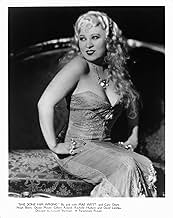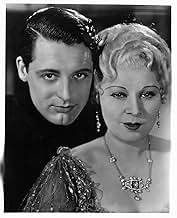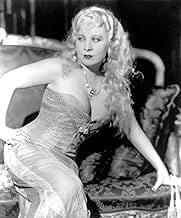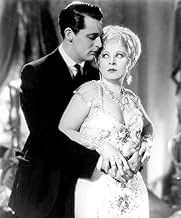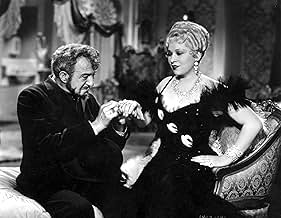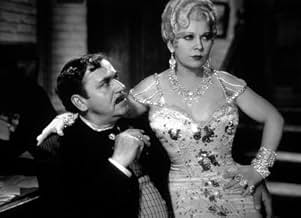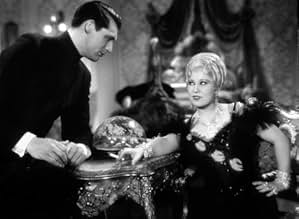VALUTAZIONE IMDb
6,3/10
7439
LA TUA VALUTAZIONE
Aggiungi una trama nella tua linguaIn the Gay Nineties, a seductive nightclub singer contends with several suitors, including a jealous escaped convict and a handsome temperance league member.In the Gay Nineties, a seductive nightclub singer contends with several suitors, including a jealous escaped convict and a handsome temperance league member.In the Gay Nineties, a seductive nightclub singer contends with several suitors, including a jealous escaped convict and a handsome temperance league member.
- Candidato a 1 Oscar
- 5 vittorie e 1 candidatura in totale
Noah Beery
- Gus Jordan
- (as Noah Beery Sr.)
Robert Homans
- Doheney
- (as Robert E. Homans)
Ernie Adams
- Man in Audience
- (non citato nei titoli originali)
Billy Bletcher
- Singing Waiter
- (non citato nei titoli originali)
Wade Boteler
- Dan's Pal
- (non citato nei titoli originali)
Jack Carr
- Patron Who Hits His Girl
- (non citato nei titoli originali)
Recensioni in evidenza
She Done Him Wrong (1933)
*** (out of 4)
Set during the "Gay Ninetiest," Mae West stars as Lady Lou, a nightclub singer who pretty much seduces and vamps over any man that enters the club. Since she has her pick of the litter she sets her sights on the handsome Captain Cummings (Cary Grant).
To say SHE DONE HIM WRONG was 100% Mae West would be an understatement. The actress was a smash on Broadway and her sexual act was quite legendary even during a time when that type of thing wasn't always wanted or allowed. Her stage play was attempted to get on the big screen for a couple years before this film finally did it even though it had to be watered down some. With that said, there's still plenty of sexuality on display here, although you can't help but think this is one of the films that helped eventually bring on the Production Code.
As far as the film goes, it was a smash when it was originally released and it even got a Best Picture Oscar nomination. Watching it today the film is obviously not as strong but at the same time you can't help but watch it and just imagine how people must have felt about it in 1933. The main reason to watch this is of course for the performance of West who is pretty much playing herself. The over-the-top, heated sexuality is actually a lot of fun to watch. You know, I've never found her to be an "attractive" woman but the way she forces her sexuality is just something that works.
The supporting cast is quite good including Grant in another early role where he's pretty much playing that good looking guy that's the object of the main characters affection. Owen Moore, Noah Beery, Sr. and Gilbert Roland are all good as well. The screenplay is another plus or at least the dialogue spoken by West is. She gets a couple classic lines and her delivery is certainly a plus. With that said, the story itself is pretty hit and miss but the 66-minute running time does fly by.
*** (out of 4)
Set during the "Gay Ninetiest," Mae West stars as Lady Lou, a nightclub singer who pretty much seduces and vamps over any man that enters the club. Since she has her pick of the litter she sets her sights on the handsome Captain Cummings (Cary Grant).
To say SHE DONE HIM WRONG was 100% Mae West would be an understatement. The actress was a smash on Broadway and her sexual act was quite legendary even during a time when that type of thing wasn't always wanted or allowed. Her stage play was attempted to get on the big screen for a couple years before this film finally did it even though it had to be watered down some. With that said, there's still plenty of sexuality on display here, although you can't help but think this is one of the films that helped eventually bring on the Production Code.
As far as the film goes, it was a smash when it was originally released and it even got a Best Picture Oscar nomination. Watching it today the film is obviously not as strong but at the same time you can't help but watch it and just imagine how people must have felt about it in 1933. The main reason to watch this is of course for the performance of West who is pretty much playing herself. The over-the-top, heated sexuality is actually a lot of fun to watch. You know, I've never found her to be an "attractive" woman but the way she forces her sexuality is just something that works.
The supporting cast is quite good including Grant in another early role where he's pretty much playing that good looking guy that's the object of the main characters affection. Owen Moore, Noah Beery, Sr. and Gilbert Roland are all good as well. The screenplay is another plus or at least the dialogue spoken by West is. She gets a couple classic lines and her delivery is certainly a plus. With that said, the story itself is pretty hit and miss but the 66-minute running time does fly by.
It's really a privilege to be able to see an icon like Mae West on film. This early talkie is Mae at her best - precode, dripping in diamonds and one-liners. It's a shame that later in life, she became a parody of herself. She was an important figure not only in theater but in early film.
Mae was not only a talented performer, she was a gifted writer and knew how to showcase herself. Though "She Done Him Wrong" is light on plot, it's heavy on Mae, and frankly, who cares about anything else? She's Lady Lou, a bawdy singer, with her hourglass figure shown to great advantage in a variety of gowns. All men want her - and let's face it, many men have had her! When she visits her ex-boyfriend in jail, she knows ever other con in the place.
This is a fascinating movie on so many levels. Besides Mae and her precode innuendos, it has Cary Grant's star-making performance (though Grant always disliked West's claim that she discovered him). It's the film that saved Paramount from bankruptcy. It's one of the films that brought on the code. Most interesting to me is, the audiences loved it! These audiences would very soon (like the next year) be deprived of the sexual double entendre and morality found in this film. Rather than the early audiences being naive and unsophisticated, it was the banning of certain language and situations in film that gave rise to the idea of a false world: that once, there were no shades of gray, all unmarried women were virgins, the bad guy always lost, and no bad deed goes unpunished.
"She Done Him Wrong" is a great chance to see a very young and handsome Gilbert Roland and Noah Berry Sr. (whose son really resembled him) in early film roles.
An amazing artifact, some hilarious lines, and most of all - Mae.
Mae was not only a talented performer, she was a gifted writer and knew how to showcase herself. Though "She Done Him Wrong" is light on plot, it's heavy on Mae, and frankly, who cares about anything else? She's Lady Lou, a bawdy singer, with her hourglass figure shown to great advantage in a variety of gowns. All men want her - and let's face it, many men have had her! When she visits her ex-boyfriend in jail, she knows ever other con in the place.
This is a fascinating movie on so many levels. Besides Mae and her precode innuendos, it has Cary Grant's star-making performance (though Grant always disliked West's claim that she discovered him). It's the film that saved Paramount from bankruptcy. It's one of the films that brought on the code. Most interesting to me is, the audiences loved it! These audiences would very soon (like the next year) be deprived of the sexual double entendre and morality found in this film. Rather than the early audiences being naive and unsophisticated, it was the banning of certain language and situations in film that gave rise to the idea of a false world: that once, there were no shades of gray, all unmarried women were virgins, the bad guy always lost, and no bad deed goes unpunished.
"She Done Him Wrong" is a great chance to see a very young and handsome Gilbert Roland and Noah Berry Sr. (whose son really resembled him) in early film roles.
An amazing artifact, some hilarious lines, and most of all - Mae.
Set mostly in a bawdy saloon/dance hall in NYC during the 1890s, this film is a showcase for the talents of Mae West. She plays Lady Lou, a self-confident, sassy singer with a quick wit, who entertains customers with songs that have a Blues theme and were popular in vaudeville.
In this role, buxom Mae West is at her best. She struts her stuff, she wears tons of diamonds, she smiles in a slightly mischievous way, she rolls her eyes, and she speaks in a voice that is more than a little nasal. Her costumes are glamorous and flamboyant. In short, she presents an on-screen image that is wonderfully ... unique.
The film's story is thin and largely irrelevant. It involves the people around Lady Lou, some of whom are schemers and cheats. Implicit sexual references in the dialogue, and the character of Lady Lou, led the "National Legion of Decency" to push down our throats the Production Code, a wretched policy device that censored cinematic content for some thirty years thereafter.
If I have a complaint with this film it is that the story is too serious. Mae West is placed in scenes that allow her merely to recite dialogue. She is less an actress than a singer and on-stage performer. I would have preferred a more lighthearted musical theme, to play up her musical talents.
And so for me, the best parts of this film are the musical numbers few though they may be. Mae West sings "Frankie And Johnny" and a couple of other songs. One of my favorite sequences occurs about midway through the film. In what appears to be an authentically designed music hall set, an Irish tenor with a big mustache sings "Silver Threads Among The Gold", a musical tearjerker popular with barbershop quartets of that era. The song's sad theme prompts a man in the audience literally to "cry in his beer". Gas lights point upward to the stage. And behind the singing tenor, a curtain sways back and forth, with product signs that read "Old Whiskey", "Dijon Burgundy", among others. It's a sequence that is straight out of vaudeville. Marvelous!
"She Done Him Wrong" is a film whose story almost gets in the way of the main character, played by a legendary talent. The film is worth watching more than once, but only to see marvelous Mae West, and to listen to those wonderful songs from the bygone days of vaudeville.
In this role, buxom Mae West is at her best. She struts her stuff, she wears tons of diamonds, she smiles in a slightly mischievous way, she rolls her eyes, and she speaks in a voice that is more than a little nasal. Her costumes are glamorous and flamboyant. In short, she presents an on-screen image that is wonderfully ... unique.
The film's story is thin and largely irrelevant. It involves the people around Lady Lou, some of whom are schemers and cheats. Implicit sexual references in the dialogue, and the character of Lady Lou, led the "National Legion of Decency" to push down our throats the Production Code, a wretched policy device that censored cinematic content for some thirty years thereafter.
If I have a complaint with this film it is that the story is too serious. Mae West is placed in scenes that allow her merely to recite dialogue. She is less an actress than a singer and on-stage performer. I would have preferred a more lighthearted musical theme, to play up her musical talents.
And so for me, the best parts of this film are the musical numbers few though they may be. Mae West sings "Frankie And Johnny" and a couple of other songs. One of my favorite sequences occurs about midway through the film. In what appears to be an authentically designed music hall set, an Irish tenor with a big mustache sings "Silver Threads Among The Gold", a musical tearjerker popular with barbershop quartets of that era. The song's sad theme prompts a man in the audience literally to "cry in his beer". Gas lights point upward to the stage. And behind the singing tenor, a curtain sways back and forth, with product signs that read "Old Whiskey", "Dijon Burgundy", among others. It's a sequence that is straight out of vaudeville. Marvelous!
"She Done Him Wrong" is a film whose story almost gets in the way of the main character, played by a legendary talent. The film is worth watching more than once, but only to see marvelous Mae West, and to listen to those wonderful songs from the bygone days of vaudeville.
After a supporting role in the George Raft film Night After Night, Paramount films realized what a gold mine they had in Mae West. Between her and a young radio singer named Bing Crosby, they pulled Paramount from the brink of bankruptcy, the white mountain studio nearly went under in the early Thirties.
After this the studio gave Mae her head in choosing material and she decided to use one of her own original plays, She Done Him Wrong. The story is set in the Bowery district of the 1890s and New York of the 1890s is where Mae grew up, she had a good ear and a good memory for character types she uses in the film.
Mae always plays Mae West and would you really want her as anyone else? She's a Bowery entertainer of the period, working in this case for Noah Beery's club as the main attraction. Beery's into some really shady business, he doubles in white slavery and nearly gets innocent Rochelle Hudson who tries to kill herself in his club. Mae saves her, but turns her over to Beery because she doesn't know about his other sideline. All she knows is that he pays off in diamonds as well as cash.
Besides Beery panting after her, we've got silent screen star Owen Moore, young Gilbert Roland who is the assistant to white slaver Rafaela Ottiana and in the film that would be his breakthrough, Cary Grant as a Salvation Army worker who's not all he seems. Mae personally picked Grant for his role, he was a young Paramount contract player beginning to get some notice. But as I said before in my review of I'm No Angel, this is not a Cary Grant film, this is a Mae West film.
Mae besides being one of the great sex symbols of the last century had a great memory and eye for detail of the bawdy Bowery of her youth. Good thing she came along before The Code was put in place. Her first films are her best, The Code definitely hampered her style.
And Mae West if she had anything, had style.
After this the studio gave Mae her head in choosing material and she decided to use one of her own original plays, She Done Him Wrong. The story is set in the Bowery district of the 1890s and New York of the 1890s is where Mae grew up, she had a good ear and a good memory for character types she uses in the film.
Mae always plays Mae West and would you really want her as anyone else? She's a Bowery entertainer of the period, working in this case for Noah Beery's club as the main attraction. Beery's into some really shady business, he doubles in white slavery and nearly gets innocent Rochelle Hudson who tries to kill herself in his club. Mae saves her, but turns her over to Beery because she doesn't know about his other sideline. All she knows is that he pays off in diamonds as well as cash.
Besides Beery panting after her, we've got silent screen star Owen Moore, young Gilbert Roland who is the assistant to white slaver Rafaela Ottiana and in the film that would be his breakthrough, Cary Grant as a Salvation Army worker who's not all he seems. Mae personally picked Grant for his role, he was a young Paramount contract player beginning to get some notice. But as I said before in my review of I'm No Angel, this is not a Cary Grant film, this is a Mae West film.
Mae besides being one of the great sex symbols of the last century had a great memory and eye for detail of the bawdy Bowery of her youth. Good thing she came along before The Code was put in place. Her first films are her best, The Code definitely hampered her style.
And Mae West if she had anything, had style.
Mae West was a veteran of burlesque, vaudeville and the Broadway stage by the time she made her first film in 1932 at the age of 39. `She Done Him Wrong' was her second film and her first starring role in an adaptation of her smash Broadway hit `Diamond Lil'. It was a play that West had written herself and it played to packed houses on Broadway for years. This film was nominated for an Academy Award for best picture and made Cary Grant into an instant star. Mae went on to write nine of the fourteen screenplays for films in which she was to star. Thus, all those great quotes we've heard that are attributed to her were not only said by her, but written by her as well. By 1935, she was the most highly paid woman in America. To this day, she remains one of the female stars most often imitated by female impersonators.
This film is among her best. It is full of the bawdy double entendre that became her trademark. She was the queen of sexual innuendo and suggestive dialogue and many of her lines have become part of Americana (e.g. `Is that a gun in your pocket or are you just glad to see me?' And, `A hard man is good to find.' And of course, `Come up and see me sometime.')
The plot of this film is simplistic and it is clearly a vehicle for her enormous talent, leading up to the now famous proposal by Cary Grant at the end of the film. Mae commands every frame of the film with her incomparable combination of sex appeal and ribald humor. Her sense of comic timing is impeccable making the funny lines she writes that much more hilarious by the snide way in which she delivers them.
Before this film, Cary Grant had appeared in half a dozen films and was building a reputation as a solid actor. However, none of his early films gave him the exposure that this film did due to its wild popularity at the time. West handpicked him for the part saying that he combined virility with the bearing of a gentleman. She wanted someone who would epitomize the now famous line, `Hello, warm, dark and handsome.' Though his role in this film is minor compared to West's, it made him a household name and a bankable star.
This classic film is a piece of film history that shouldn't be missed. I rated it a 10/10. It is among Mae West's best moments. I highly recommend it.
This film is among her best. It is full of the bawdy double entendre that became her trademark. She was the queen of sexual innuendo and suggestive dialogue and many of her lines have become part of Americana (e.g. `Is that a gun in your pocket or are you just glad to see me?' And, `A hard man is good to find.' And of course, `Come up and see me sometime.')
The plot of this film is simplistic and it is clearly a vehicle for her enormous talent, leading up to the now famous proposal by Cary Grant at the end of the film. Mae commands every frame of the film with her incomparable combination of sex appeal and ribald humor. Her sense of comic timing is impeccable making the funny lines she writes that much more hilarious by the snide way in which she delivers them.
Before this film, Cary Grant had appeared in half a dozen films and was building a reputation as a solid actor. However, none of his early films gave him the exposure that this film did due to its wild popularity at the time. West handpicked him for the part saying that he combined virility with the bearing of a gentleman. She wanted someone who would epitomize the now famous line, `Hello, warm, dark and handsome.' Though his role in this film is minor compared to West's, it made him a household name and a bankable star.
This classic film is a piece of film history that shouldn't be missed. I rated it a 10/10. It is among Mae West's best moments. I highly recommend it.
Lo sapevi?
- BlooperShadow of camera moves against the back wall of Lady Lou's apartment while she and Sally are talking.
- Versioni alternativeMaryland, Massachusetts, New York, Ohio, and Pennsylvania removed the song "A Guy What Takes His Time". Will H. Hays and Adolph Zukor went to New York to edit the song to an entrance by Mae West, one opening verse, and one closing verse to lessen the suggestiveness. Despite this, Ohio and Pennsylvania cut all of West's one liners.
- ConnessioniFeatured in The Twentieth Century: The Movies Learn to Talk (1959)
I più visti
Accedi per valutare e creare un elenco di titoli salvati per ottenere consigli personalizzati
- How long is She Done Him Wrong?Powered by Alexa
Dettagli
- Data di uscita
- Paese di origine
- Lingua
- Celebre anche come
- Nació para pecar
- Luoghi delle riprese
- Azienda produttrice
- Vedi altri crediti dell’azienda su IMDbPro
Botteghino
- Budget
- 200.000 USD (previsto)
- Tempo di esecuzione
- 1h 6min(66 min)
- Colore
- Proporzioni
- 1.37 : 1
Contribuisci a questa pagina
Suggerisci una modifica o aggiungi i contenuti mancanti


